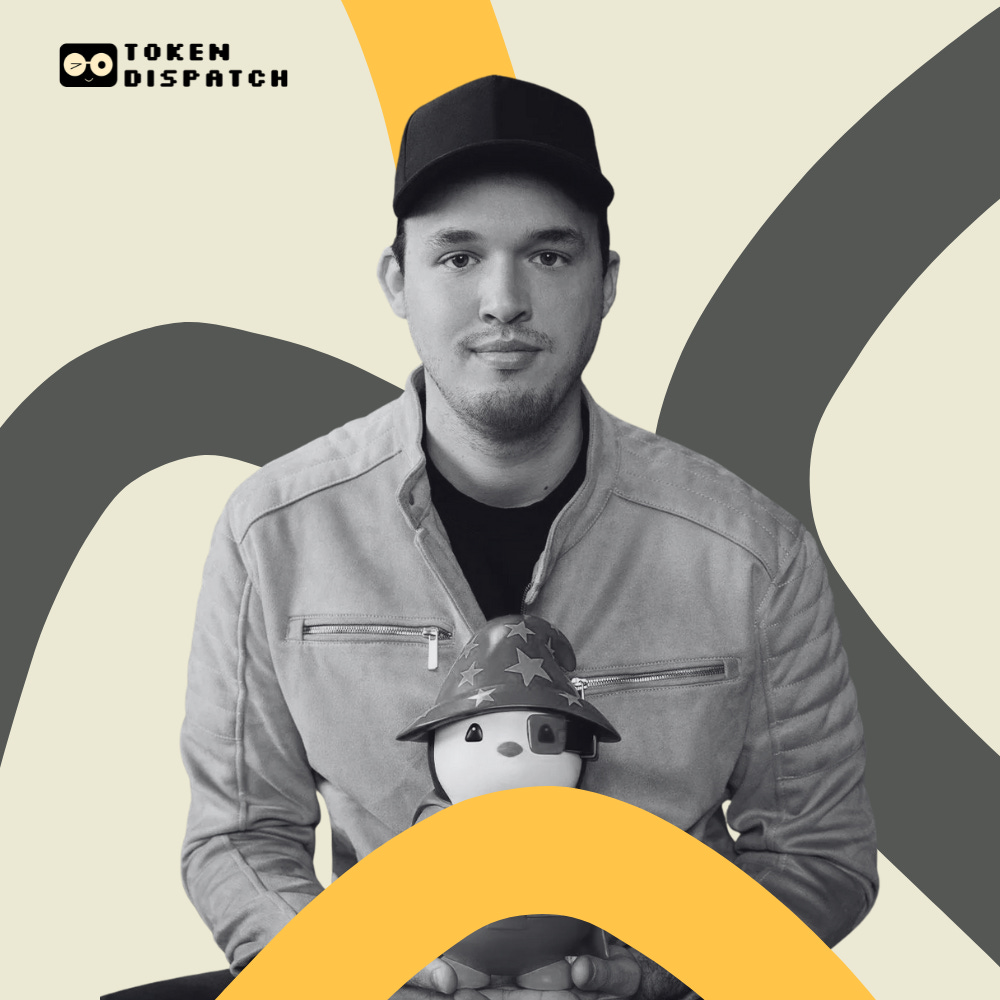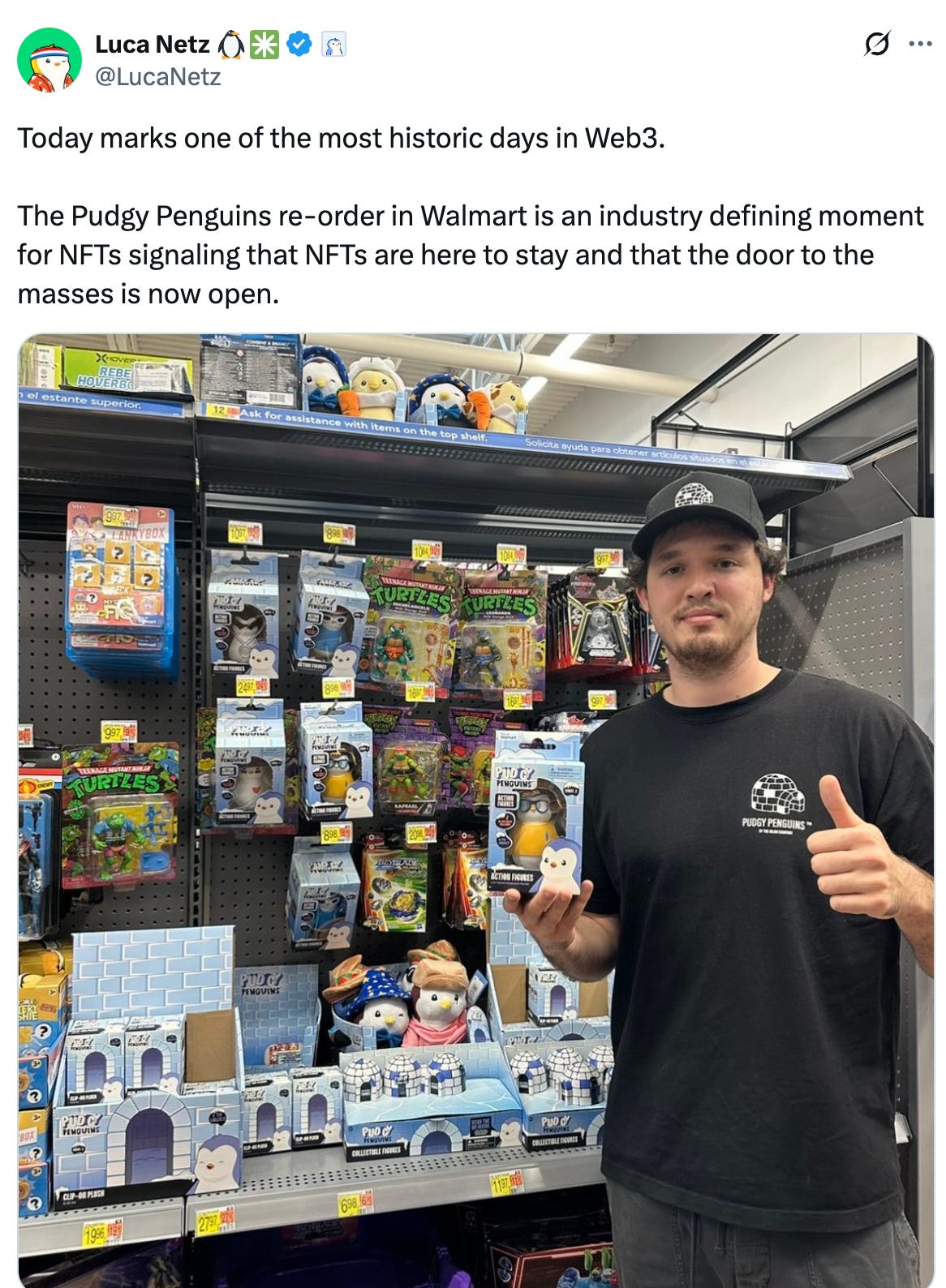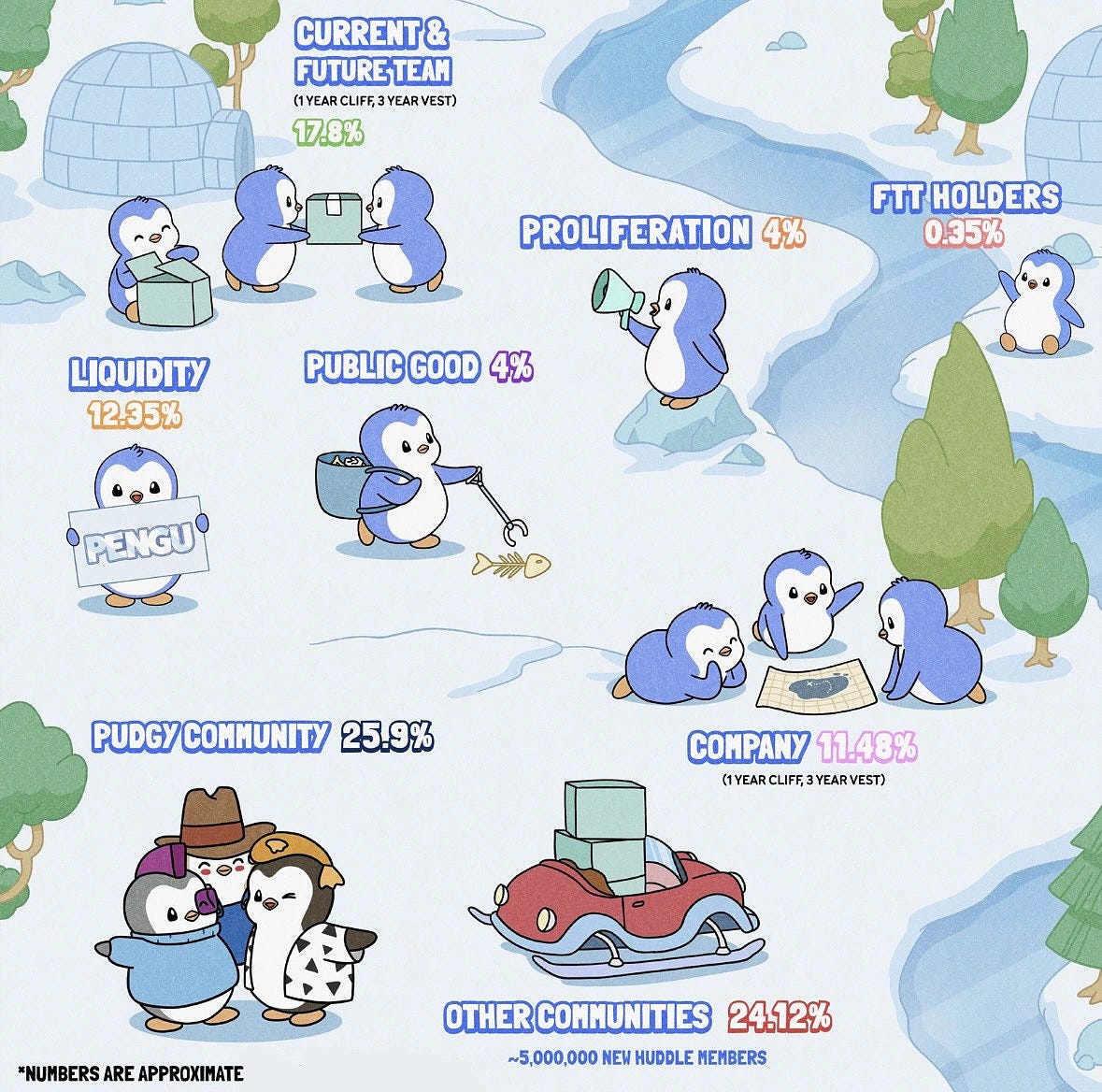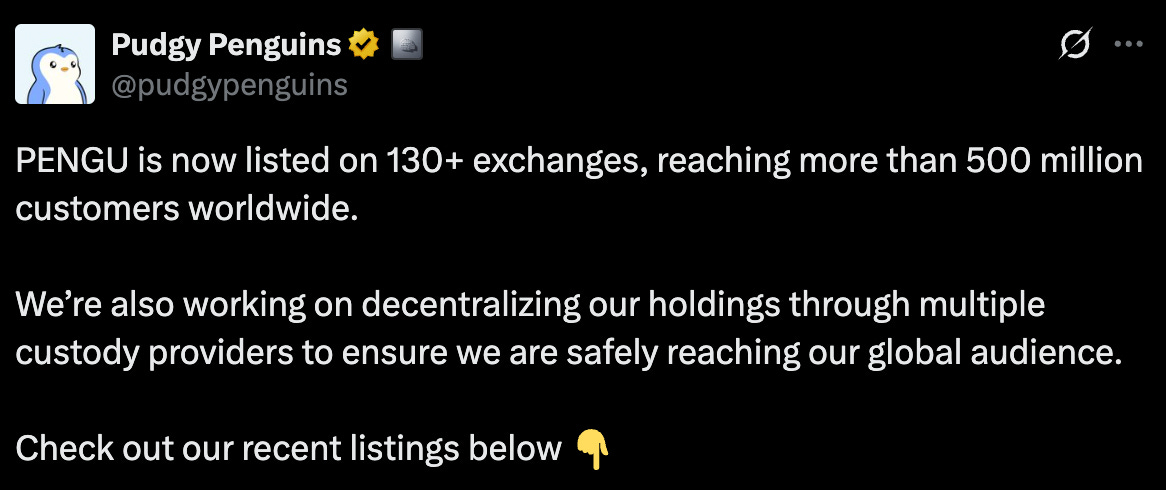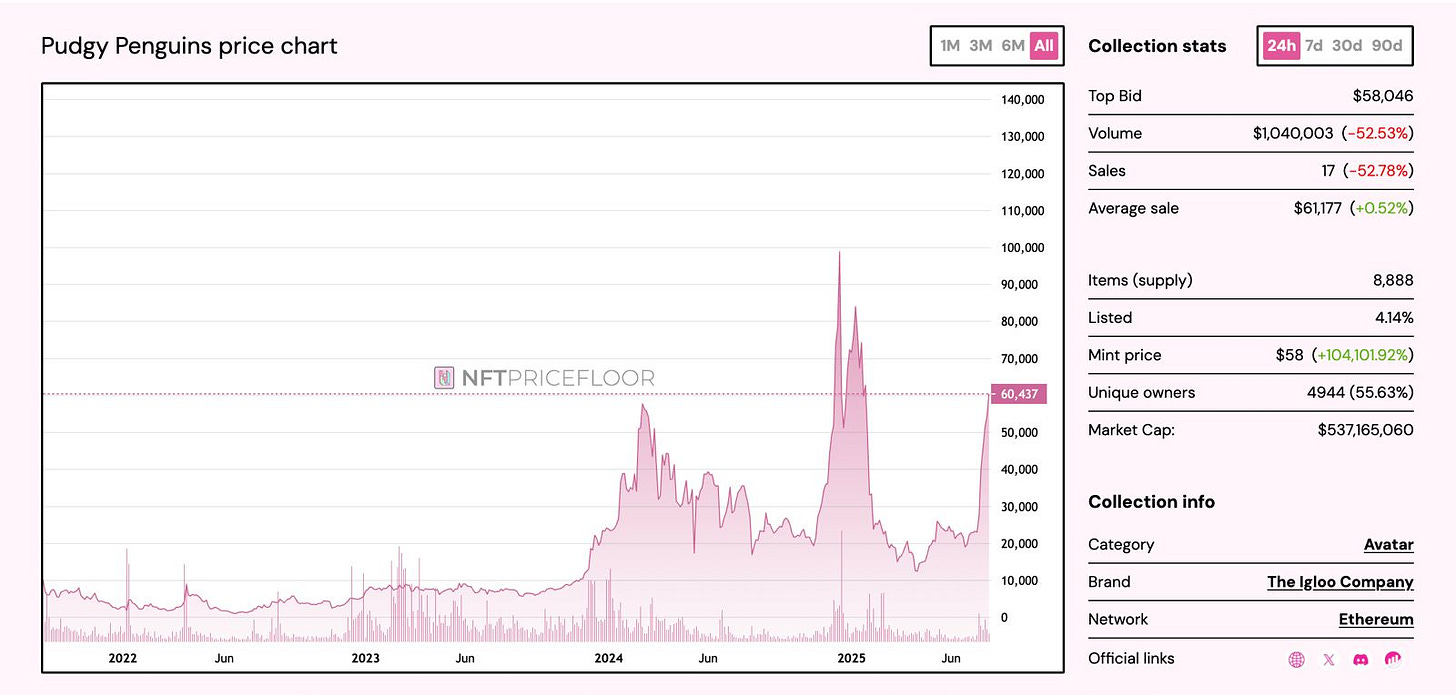The Luca Netz Story 🐧
Building an empire around the most adorable ambassadors imaginable: penguins.
The boxes at Ring's fulfilment centre weren't going to pack themselves, but sixteen-year-old Luca Netz kept getting distracted. Around him, coworkers moved through their shifts with practised efficiency. But Netz was preoccupied with transforming a scrappy startup into what would become a billion-dollar acquisition.
He'd dropped out of high school for this warehouse job, had spent most of his childhood sleeping wherever his mother could find space, and now, he had a front-row seat to how companies actually build wealth.
The experience taught him how startups scale, burn through cash, and fight to survive long enough to reach escape velocity.
That lesson proved invaluable years later when Netz placed a $2.5 million bet on a collection of cartoon penguins that most people dismissed as worthless. Today, those same penguins sit on Walmart shelves, and the once-homeless teenager from Los Angeles is now one of crypto's most influential builders, worth over $100 million at age 25.
"We were homeless for about 10 years," Netz recalls matter-of-factly. “We lived all over the world, from South Africa to Paris to London to New York City to Los Angeles. We did that as long as my mom could muster [the courage for] it.”
Build the Skillset Crypto Teams Are Hiring For
Safary Certification is a 4‑week bootcamp taught by the very people behind growth at Kraken, Stargate, EigenLayer, and others.
In this bootcamp, you’ll learn:
How to position a crypto brand using narrative-first frameworks.
Funnel-building from acquisition to retention using onchain data.
Partnership strategies & token launch playbooks.
Building a personal brand that gets you hired in web3 growth.
Cohort 1 had 170 students. Cohort 2 kicks off August 1 with only 100 seats.
The Making of a Hustler
Netz’s mother, an undocumented immigrant from France who spoke little English, struggled to find stable work. They moved around constantly, staying with friends, acquaintances, and sometimes even complete strangers who were willing to take them in temporarily. For young Luca, home was wherever they happened to sleep that week.
Most would view such an upbringing as a handicap. Netz learned to see it as an education. Constant displacement taught him adaptability. Uncertainty trained him to spot opportunities others overlooked. Hunger taught him to move fast when those opportunities struck.
By the time he was in middle school, Netz had figured out a simple truth: his classmates would pay more for convenience than a walk to Burger King. So, he started buying chicken sandwiches and snacks, then sold them from his backpack at a markup. Simple math, but it worked.
Netz was twelve when his family finally landed in mid-city Los Angeles. There, for the first time, he got a real taste of staying put. The constant moving stopped. At least, for a few years.
At sixteen, Netz dropped out of high school and printed a hundred resumes. Then he walked down the Tech Row in Santa Monica, going door-to-door at every startup he could find, handing them out like he was campaigning for something.
Ring hired him. This was in 2015, when the smart doorbell company had just twenty employees and big dreams. Netz started out in the warehouse — packing boxes and processing orders — the kind of work most people do without thinking much about it. But he was paying attention to things way beyond: the funding rounds, the hiring sprees, and the way problems got solved (or didn't).
He watched Ring grow from a scrappy startup into a billion-dollar Amazon acquisition target. While he packed boxes, venture capital poured in. While he processed orders, the company scaled. He was getting an education in startup mechanics that most mainstream MBAs never see.
"I was able to see on the ground level what a company went from raising a million dollars to being a billion-dollar company," Netz recalled.
The Gold Chain Epiphany
While working at Ring, 16-year-old Netz started noticing something peculiar about hip-hop culture. Rappers would spend tens of thousands, sometimes even hundreds of thousands of dollars on gold chains and diamond jewellery. But when he looked closer, he realised most fans couldn't tell the difference between a $100,000 chain and a $200 gold-plated replica.
That observation became the foundation of his first real business. Netz found suppliers for gold-plated chains and cubic zirconia diamonds that looked nearly identical to the expensive versions. Then he developed a marketing strategy that was both simple and brilliant: he would pay fan pages of popular rappers $50 to $100 to promote his jewellery.
"Every single time I paid them, and they posted my promotion, we would make $1,000 to $2,000 to $5,000 back every single time," he recalls. The return on investment was so strong that he could reinvest profits immediately and scale aggressively.
Within nine months of launching his drop-shipping business on Shopify, Netz had generated his first million dollars in revenue. He was 18 years old. Eventually, he sold the jewellery business for $8 million, giving him the capital to pursue bigger things.
With money in the bank, Netz began diversifying, drawing on his experience with social media marketing from the jewellery business. He served as Chief Marketing Officer for Von Dutch, the iconic clothing brand, gaining experience in established brand management.
Then he went on to become CMO and a major investor in Gel Blaster, a toy company manufacturing Orbeez-based toy guns. Under his marketing leadership, Gel Blaster achieved significant market success and became what industry publications described as "North America's fastest growing toy company."
But the universe had something else, something more adorable in store for him.
The Penguin Rescue
In early 2022, the NFT market was still riding high from the previous year's explosion. Digital art was selling for millions, celebrities were changing their profile pictures to cartoon apes, and new projects launched daily with promises of building the next Disney.
Among them was Pudgy Penguins, a collection of 8,888 cartoon penguin NFTs that had captured attention with their adorable designs and strong community. But by January 2022, the project was in crisis. The original founders had over-promised and under-delivered on roadmap items. There were allegations of treasury mismanagement, and community trust had collapsed.
On January 6, 2022, the community voted to oust the original founders. That same day, Netz made a public offer on Twitter: 750 ETH (roughly $2.5 million at the time) for the entire Pudgy Penguins collection along with intellectual property rights.
It wasn't an easy decision. The purchase happened just one week before the NFT market entered what would soon become a two-year bear market. Netz and his executive team had pooled resources for the acquisition and were working without salaries for a year while pouring another half million of their own money into keeping the project alive.
What attracted him was the potential he saw for building something lasting. "If I wasn't able to close my eyes and picture Pudgy Penguins as a billion-dollar brand, I would never have purchased it," he says.
Beyond Digital Collectables
Most people expected Netz to flip Pudgy Penguins, clean up the mess, pump the floor price, and sell to the next buyer. Instead, he ignored the NFT market entirely.
Under his leadership at Igloo Inc., Pudgy Penguins became something unprecedented: a crypto brand that worked in the real world. Netz built six different revenue streams: digital experiences, physical products, licensing deals, content creation, film and TV development, and gaming. Not just profile pictures anymore, the penguins became characters in a much larger story.
The physical products gambit seemed insane at first. Crypto people buying cartoon penguin plushies? But Netz wasn't targeting crypto people. He was targeting parents at Walmart.
Each plush toy comes with a QR code that ushers buyers into "Pudgy World", which is a digital space where they get a crypto wallet and can claim NFT wearables.
Pudgy World is a free-to-play 3D browser game, lets players customise penguin avatars and explore virtual worlds using their NFTs and physical toys, seamlessly integrating Web3 ownership with accessible gaming. Parents think they're buying a stuffed animal for their kid. But, they're actually onboarding to Web3 without realising it.
The strategy worked in ways nobody predicted. Pudgy Penguins toys now sit on shelves at Walmart, Target, Chuck E. Cheese, Amazon, and Walgreens. Over 1.5 million toys sold. More than $10 million in revenue in one year.
While other NFT projects collapsed or pivoted desperately, Pudgy Penguins had quietly become a crypto brand that didn't need crypto to survive.
The Token Launch
On December 13, 2024, Netz dropped $1.5 billion worth of PENGU tokens into the wallets of millions of users across the crypto ecosystem. The largest airdrop in Solana's history. He chose Solana for its lower transaction fees and higher throughput to maximise accessibility.
25.9% of the tokens went to the Pudgy Penguin community, 24.12% to other communities and new member onboarding, and the remainder was split between team members (with vesting schedules), liquidity, and company reserves.
The launch sparked intense debate in the crypto community. Some praised the broad distribution as democratising access to the project's success. Others criticised giving tokens to millions of wallets rather than concentrating rewards among long-term holders.
Netz defends the strategy: "I wasn't trying to launch a $2 billion token and that be the ceiling forever. I'm going after the big kahuna. I'm going after Doge." His thesis is that for PENGU to reach the scale of established meme coins like Dogecoin, it needed a distribution story that could resonate with mainstream audiences.
The token's journey since launch has validated some of Netz's bold predictions. After debuting with a market cap of around $2.3 billion, PENGU experienced the typical volatility of major token launches, dropping significantly before eventually finding support levels. The token spent months consolidating between key price levels, building a foundation for what would become a dramatic rally.
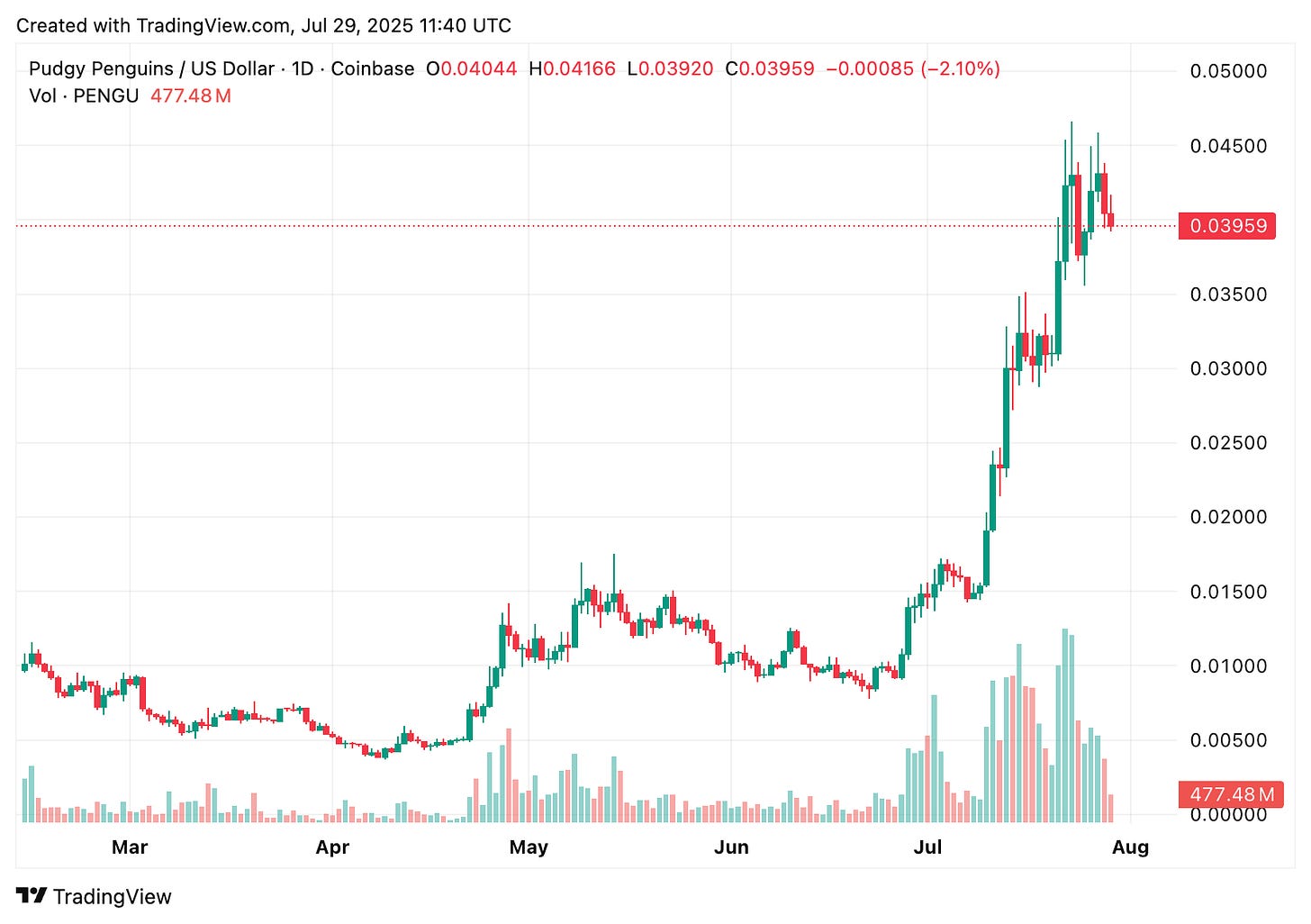
By mid-2025, PENGU surged over 300% in a matter of weeks, pushing its market cap beyond $2.5 billion as whale accumulation increased and trading volumes topped $2.5 billion daily.
The rally was fueled by multiple catalysts that demonstrated the ecosystem's growing mainstream appeal. The most significant driver was Canary Capital's groundbreaking application to the SEC for a PENGU/NFT-focused ETF. This institutional validation created massive FOMO across the market and signalled that traditional finance was taking notice of the Pudgy Penguins ecosystem. Whale accumulation provided the technical foundation for the surge, with over 200 million PENGU tokens acquired by large holders since July alone, while trading volumes spiked to reflect heightened institutional and retail interest.
Strategic partnerships with mainstream brands including NASCAR, Lufthansa, and Suplay Inc. brought unprecedented visibility beyond crypto circles. Adding fuel to the speculation fire were persistent rumours of a potential OpenSea acquisition by Pudgy Penguins, which the team denied later.
Meanwhile, the original NFT collection has maintained strong performance, with floor prices holding around 15-16 ETH, a significant recovery from bear market lows and validation of Netz's strategy to build lasting value beyond short-term hype.
Building the Consumer Blockchain
Abstract launched in January 2025 as Netz's biggest gamble yet: a blockchain that doesn't feel like a blockchain. No wallet setup. No seed phrases to store. No gas fees to calculate. Users can start transacting without knowing they're using blockchain technology at all.
Netz believes the blockchain is the least interesting thing about Abstract. In his view, consumers won't come on-chain until they have a reason to, and they can't until the friction disappears. More than anything, he wanted Abstract to be fun, a place where people could play games, collect digital items, and interact with apps without ever thinking about the underlying technology.
The vision attracted $11 million from Founders Fund and other top-tier investors. Abstract launched with over 100 apps and 400 more currently in development. These aren't DeFi protocols or trading platforms. They're gaming, music, sports, and fashion apps that happen to run on blockchain rails.
The ambition mirrors the man behind it. Netz works six twelve-hour days a week, 8 AM to 8 PM, no vacations. The only break comes between 6 and 8 PM, which he calls "critical thinking time", two hours to process the day and plan tomorrow's execution.
Abstract could be the platform that finally brings crypto to mainstream consumers. Or it could be another expensive lesson in the gap between vision and reality. For Netz, the discomfort of not knowing which way it goes is exactly the point.
Vision for the Future
Netz has a theory about what comes next. Traditional brands sell products to consumers, a one-way transaction that ends at the cash register. NFTs flip that model entirely. Instead of customers, you get participants. Instead of buyers, you get stakeholders who share in the upside when the brand succeeds.
The mechanism creates unprecedented alignment. When Pudgy Penguin holders promote the brand, they, by default, become investors protecting their own assets. When the toys hit Walmart shelves, every NFT holder wins. It's capitalism with skin in the game for everyone involved.
But Netz isn't thinking about quarterly earnings. He's building for decades. The full Pudgy World experience, eighteen months in development with hundreds of thousands of accounts already created, is set to launch soon. He's planning aggressive expansion into Asia-Pacific markets, betting that the next crypto surge emerges from the East.
At twenty-five, Luca Netz sits at the intersection of two worlds that weren't meant to collide. On one end, the chaotic, speculative universe of cryptocurrency, where fortunes evaporate in minutes. On the other end, the slow-moving machinery of traditional retail, where landing shelf space at Walmart requires months of negotiations and a proven track record.
Most people would pick a side. Netz built a bridge.
He knew that the future wasn't about choosing between digital and physical, between community and commerce, between innovation and accessibility, but rather proving they were never opposites in the first place.
Every Pudgy Penguin toy sold at Target carries a QR code that unlocks a digital world. Every PENGU token traded represents ownership in a brand that exists simultaneously as blockchain code and retail merchandise. Every Abstract user who signs up with just an email enters the future of finance without knowing they've crossed the threshold.
This is Netz's revolution. Making the impossible feel inevitable. He didn't disrupt industries. He taught them to speak to each other.
Throughout crypto's short history, most success stories follow a familiar arc: technical breakthrough, venture funding, explosive growth, and eventual irrelevance. Netz wrote a different script. He turned the industry's biggest weakness — its opacity to everyday people — into his competitive advantage.
Some entrepreneurs build companies. Others build movements. Netz built a new category of existence. One where digital ownership feels as natural as holding a stuffed animal, where global communities form around shared joy rather than shared interests, where the most sophisticated technology hides behind the simplest experiences.
Token Dispatch is a daily crypto newsletter handpicked and crafted with love by human bots. If you want to reach out to 200,000+ subscriber community of the Token Dispatch, you can explore the partnership opportunities with us 🙌
📩 Fill out this form to submit your details and book a meeting with us directly.
Disclaimer: This newsletter contains analysis and opinions of the author. Content is for informational purposes only, not financial advice. Trading crypto involves substantial risk - your capital is at risk. Do your own research.



